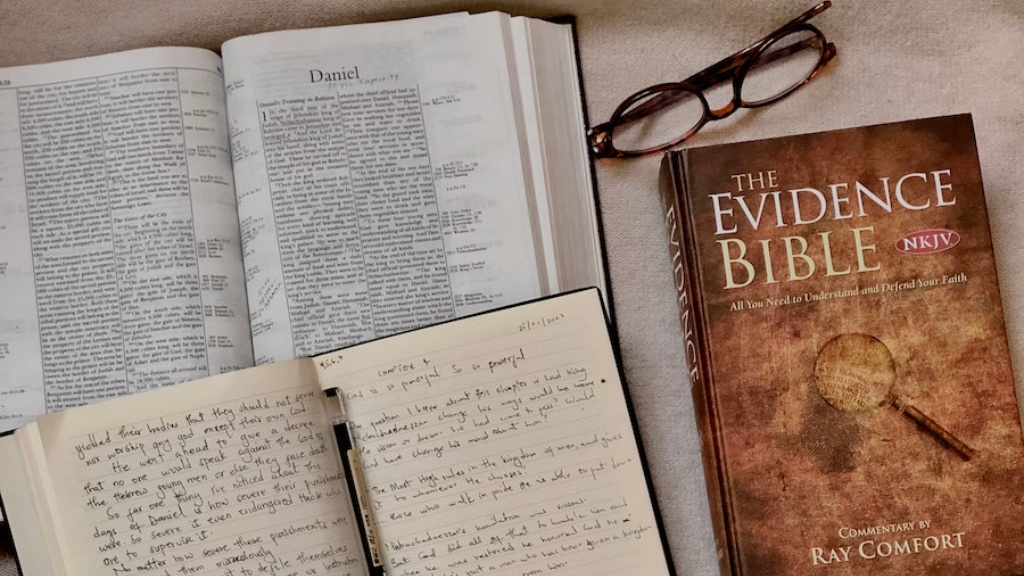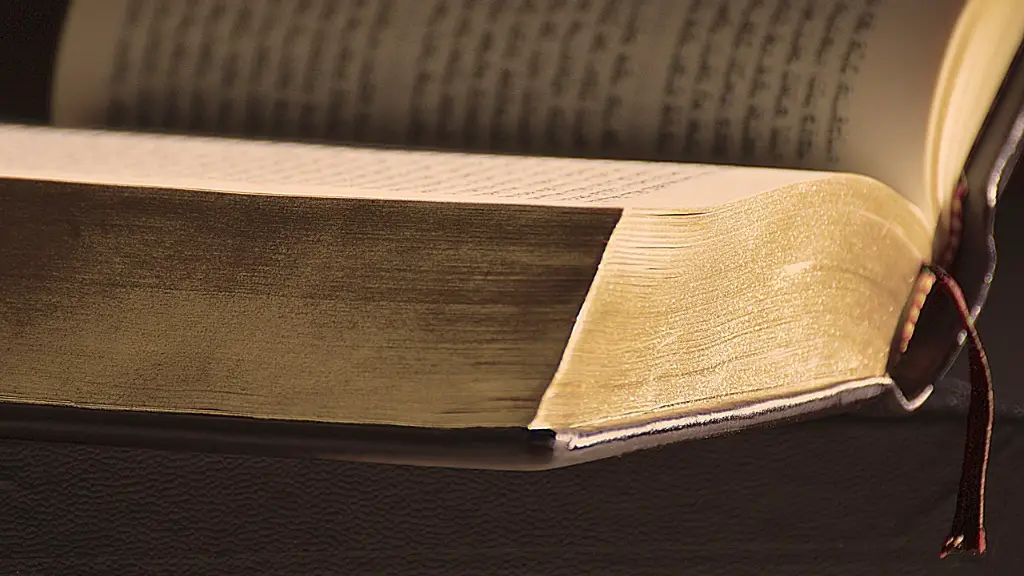Zion and Jerusalem in the Bible
Throughout the Bible, Zion and Jerusalem are frequently mentioned together as if they are virtually the same thing. Despite their similarities, these two places have distinct differences in their complex histories, meaning and locations. Zion is a hill located in the City of Jerusalem, but it holds a much deeper meaning than a single geographic area.
In the Bible, Zion is referred to as the site of God’s holy temple and the symbolic center of both worship and justice. According to the Hebrew Bible, Mount Zion is believed to have been built by King David. It is described in biblical texts as the “city of David,” an area within Jerusalem, which was named for him. In turn, it is referred to as the home of the temple, where most religious Israelites would perform the rituals required for worship.
However, the association of Zion and Jerusalem is far from static. While Zion and Jerusalem are intimately linked in Biblical literature, their understanding in a contemporary setting is rather different. The challenge of representing this history and understanding in a modern context is evident in the various naming conventions and interpretations that are featured in the media, religious texts, and even within popular culture.
Over time, Zion and Jerusalem have taken on many new meanings. While Zion has remained a symbol of hope, freedom and justice to many people of faith, the term has often been taken up by those promoting political causes. In the Qur’an, Jerusalem is the third-holiest city in Islam and is widely seen as the spiritual home of Muslims worldwide. Additionally, the New Testament of the Bible has associated Zion with the coming of the Messiah.
What is clear is that, while Zion and Jerusalem have been sources of contention as well as places of hope and refuge over the millennia, their symbolic power for the people of faith is something that carries on today.
Zion in Jewish Culture
The concept of Zion has deeply rooted roots in Jewish culture. Zion is not only mentioned numerous times throughout the Bible, but is also referenced in modern Jewish texts such as the Talmud and Rabbinic literature. In addition to being the place where Solomon’s Temple was built, Zion is seen by many Jews as the place of a messianic age – a time of peace and pleasure.
Zion is also an important symbol in modern Jewish culture. For example, Zionism – a movement that seeks a national homeland for the Jewish people – is named after the concept of Zion and has served as a rallying cry for Jews around the world since the late 19th century. Many Israelis today consider Jerusalem, with its many holy sites, to be their spiritual capital and a symbol of hope.
Beyond its political implications, Zion remains an important concept in world culture today. In literature, art, and music, Zion remains a central figure in the narrative of faith and justice. Many prominent figures in history have referenced Zion in their writings and speech, from ancient Biblical prophets such as Isaiah and Micah, to modern day religious leaders such as Martin Luther King Jr. and Pope Francis.
In this way, Zion remains a timeless concept that has been used to express hope and faith throughout history, and remains a source of inspiration for many people of faith today.
The Location of Zion
The location of Zion has been discussed and debated for centuries. Depending on the text, Zion is often depicted as a mountain, a valley, or even a city. While in some religious texts the term “Zion” is used to refer to the City of Jerusalem and the surrounding area, more often it is used to refer to a symbolic location – a place of refuge, hope, and justice.
Within Christian theology, Zion is often understood to refer to the heavenly Jerusalem, a place of peace and joy for Jews and Christians alike. In the Book of Apocalyptic, Zion is depicted as a celestial city that comes down from heaven to the earth. Within this framework, Zion is seen as an eternal place of refuge in times of need.
Within the Bible, Zion is often depicted as referring to a geographical place. King David is traditionally said to have built the first temple on Mount Zion as a place where the people of Israel could come to worship God. While this has been contested by some scholars, the notion of Zion as a holy sanctuary continues to be seen in some religious traditions today.
In any case, the exact geographical location of Zion continues to be a source of debate. For many believers, the holy mountain, valley, or city stands as a symbol of hope, refuge, and faith regardless of its physical location.
Symbolic Meaning of Zion
Zion has come to represent a number of ideas in modern religion. For some, Zion is a symbol of peace, justice, and freedom from oppression. In the Hebrew Bible, God promises that he will give the Israelites a land where they can worship him freely and in safety. Zion is often seen as a place of refuge to which those who are suffering can come and find solace.
In traditional Christianity, Zion is often used to refer to the coming of the Messiah, the one who will bring peace and justice to the world. In this sense, Zion is seen as a place of hope and redemption, where believers can unite and find spiritual fulfillment.
Additionally, Zion is a reminder of the power of faith. Many believe that faith is a powerful tool that can move mountains and bring peace to an otherwise chaotic world. Faith has been used to bring comfort in times of difficulty and hope in times of despair. Zion is a symbol of this power and of the hope that all will be made right in the end.
Zion in Popular Culture
Zion has also been adopted by popular culture. The term “Zion” has been used as the title for numerous books, songs, and films over the years, from 19th century literature to modern Hollywood blockbusters. In some works, Zion is used to depict a utopian society, a place where everyone is equal and everyone is free.
In other works, Zion is used to reference a city of refuge. In the popular Matrix franchise, Zion is presented as a safe haven where humanity can gather in the face of an all-encompassing machine threat. In all these works, Zion is presented as a source of hope, freedom, and justice.
The concept of Zion has also been adopted by various spiritual movements. From the Kabbalah to the New Age movement, the symbolic meaning of Zion has been embraced for its spiritual power. Twentieth century African-American spiritualists also used Zion to describe a place of redemption and spiritual awakening for African-Americans.
In this way, the term and concept of Zion has been adopted by many different cultures and movements and continues to be used as a source of inspiration and a symbol of hope.
Zion in the Modern World
In the modern world, Zion remains a potent symbol of hope, justice, and freedom. The concept is widely embraced by many people of faith and those of no faith alike, even those with drastically different religious outlooks. In this sense, it is a unifying symbol of hope and faith that transcends boundaries.
The symbolic power of Zion is also seen in political discourse. In recent decades, Zion has become a rallying cry for those seeking justice and freedom from oppression. In many circumstances, the term has served as a call for those striving for a greater good, for a better world.
The term Zion carries a certain weight that has been used throughout history to evoke feelings of faith and hope. While the exact meaning and interpretation of Zion may differ from culture to culture, its power to inspire and unite remains.
Zion Across Religions
The concept of Zion is not limited to any one religion. In many religions and cultures, Zion is understood as a place of hope and refuge for those seeking justice. For Jews, Zion serves as a metaphor for a spiritual homeland and a place to seek solace. For Christians, Zion is the earthly embodiment of a heavenly kingdom.
The notion of Zion has also been embraced in other religions including Islam, Sikhism, and Buddhism. Muslims view Jerusalem as a holy city and a source of great symbolic power. Similarly, Sikhs see the Golden Temple in Amritsar as a place of spiritual refuge and redemption. For Buddhists, Mount Wutai in China is seen as a sacred place.
In this way, Zion serves as a universal symbol of hope, justice, and peace across many faiths and cultures. Regardless of faith, many people have come to embrace Zion as a source of inspiration and assurance when confronted with hardship.
Conclusion
Zion is an important concept in the Bible and in religious texts. It is a source of hope and faith in times of difficulty and a reminder of a peaceful, utopian society. For many people of faith, Zionism is a rallying cry for justice and freedom, and its symbolism is embraced across many religious and cultural contexts. Whether understood as a hill in Jerusalem, a heavenly city, or a place of refuge, Zion remains an important show of faith in a troubled world.





